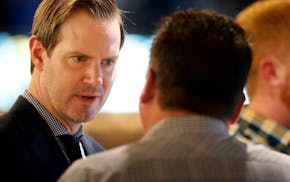Laura Domanowska and Guido Quilici met working at a neighborhood bakery on the near South Side of Chicago. They were married, stayed right there and raised two children, Frank and Rose Marie.
Frank made it to the big leagues as an infielder with the Twins in the pennant-winning season of 1965. Over the next 17 years, he was a player, a coach, a manager (mid-1972 through 1975) and a radio announcer for the team.
Through this time, there was a tradition when the Twins played the White Sox at Comiskey Park. It involved the sausages prepared by Frank's mother and lugged to the ballpark by Guido a couple of hours before the first game of a series.
"Ma would get Roma Italian sausages and the bread from Fontana's and then she added her incredible sauce," Frank said. "Pa would bring them to the ballpark in 'Polish luggage' … paper bags.
"Pa took care of everyone, including the broadcasters. Harry Caray was with the White Sox. One night he said to Jimmy Piersall, 'I'm going on a diet for a few days.' Jimmy asked why, and Harry said, 'The Twins are going to be in town and I need room for Momma Qua-leechi's sausage sandwiches.' "
My first two years on the Twins beat were 1974 and 1975, with Frank as the manager. It was an interesting way to break in: watching a young manager continue to fight against futility, even when his toughest opponent was ownership.
In 1974, Calvin Griffth gave Quilici a three-man coaching staff: pitching coach Bob Rodgers, plus old-timers Ralph Rowe and Vern Morgan. Rowe and Morgan didn't throw batting practice, meaning Quilici and Rodgers threw thousands of BP pitches over the course of the season.
In 1975, the Twins kept outfielder Steve Brye on the active list for several weeks with a cast on his broken hand. Calvin's response to Quilici's plea for a usable player was, "Brye can pinch-run."
That's what Quilici faced in those cash-strapped days for the Twins. The fact he went 280-287 (including 82-80 in 1974) made Frank more a magician than a failed manager.
Quilici left the Twins broadcast team after the 1982 season and went to work for Western Diversified, a company that works with car dealers. He had a good run there, and married Lila in 2000.
Frank has been involved in numerous charitable causes in Minnesota. His passion today is promoting organ donorship, and for good reason.
Quilici lost the function of a kidney a decade ago. The cause was "high blood pressure," which may or may not have started with the irresistibility of Roma sausages on Fontana's bread, with Ma's sauce.
"The other kidney started going downhill a few years ago," Quilici said. "We registered for a donor kidney. It was getting to the point that I was headed for dialysis."
And then Elizabeth, the wife of Frank's longtime pal Bobby, was tested, and she came out as a match. On May 14, 2012, Elizabeth donated a kidney to Frank.
"They didn't take out a kidney … just put in a third one," Quilici said. "I call her 'Little Liz.' She sits on my left hip."
Things aren't perfect. The BK virus that can attack transplanted organs struck Frank a while back. "I have 23 percent function in my working kidney," he said. "You can live with that."
The anti-rejection drug Quilici takes can have a negative impact on memory. His recollections are interrupted occasionally with a "Dang, I forgot."
"Hey, we're having 'Donor Day' at Target Field again this year, on June 29," he said. "It's all about awareness. My doctor, Jamie Gitter, has told me if we could get everyone to put 'donor' on their driver's license, the problem would be taken care of."
A twist in this is that Frank's wife, Lila, worked as a critical care nurse for Dr. Michael DeBakey, the pioneer transplant surgeon in Houston.
"A patient would wake up after heart surgery, see Lila and say, 'Am I alive? I see the face of an angel,' " Quilici said.
He might be 74, but he still can reach back and find Frankie, a smooth operator from "the neighborhood" in Chicago.
Patrick Reusse can be heard 3-6 p.m. weekdays on AM-1500. • preusse@startribune.com

Reusse: How bad are the White Sox? They made Twins look good.

Reusse's Tortured Columnist Department update: Yes, Vikings won the offseason

Reusse: Wolves need stopper for Booker? NAW, it's not a problem.

Reusse: Success on court helped Timberwolves do strong business

